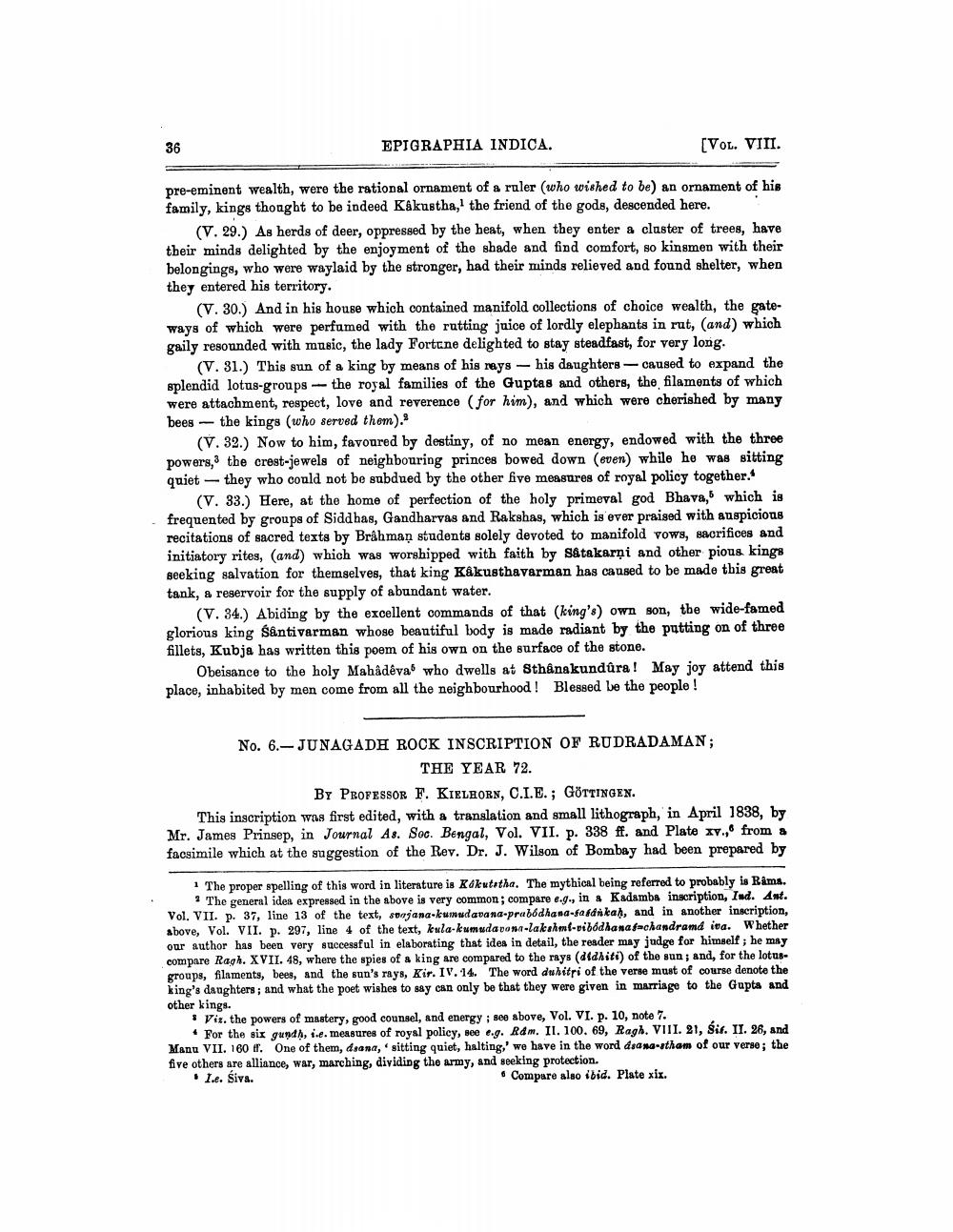________________
EPIGRAPHIA INDICA.
[Vol. VIII.
pre-eminent wealth, were the rational ornament of a ruler (who wished to be) an ornament of his family, kings thonght to be indeed Kakustha, the friend of the gods, descended here.
(V. 29.) As herds of deer, oppressed by the heat, when they enter a cluster of trees, have their minds delighted by the enjoyment of the shade and find comfort, so kinsmen with their belongings, who were waylaid by the stronger, had their minds relieved and found shelter, when they entered his territory.
(V. 30.) And in his house which contained manifold collections of choice wealth, the gateways of which were perfumed with the rutting juice of lordly elephants in rut, (and) which gaily resounded with music, the lady Fortune delighted to stay steadfast, for very long.
(V. 31.) This sun of a king by means of his reys - his daughters - caused to expand the splendid lotus-groups the royal families of the Guptas and others, the filaments of which were attachment, respect, love and reverence (for him), and which were cherished by many bees - the kings (who served them)."
(V. 32.) Now to him, favoured by destiny, of no mean energy, endowed with the three powers, the crest-jewels of neighbouring princes bowed down (even) while he was sitting quiet -- they who could not be subdued by the other five measures of royal policy together.
(V. 83.) Here, at the home of perfection of the holy primeval god Bhava, which is frequented by groups of Siddhas, Gandharvas and Rakshas, which is ever praised with auspicious recitations of sacred texts by Brahman students solely devoted to manifold vows, sacrifices and initiatory rites, (and) which was worshipped with faith by Satakarni and other pious kings seeking salvation for themselves, that king Kâkusthavarman has caused to be made this great tank, a reservoir for the supply of abundant water.
(V. 34.) Abiding by the excellent commands of that (king's) own son, the wide-famed glorious king Santivarman whose beautiful body is made radiant by the putting on of three fillets, Kubja has written this poem of his own on the surface of the stone.
Obeisance to the holy Mahadeva who dwells at Sthânakundûra! May joy attend this place, inhabited by men come from all the neighbourhood! Blessed be the people !
No. 6.-JUNAGADH ROCK INSCRIPTION OF RUDRADAMAN;
THE YEAR 72. BY PROFESSOR F. KIELHORN, C.I.E.; GÖTTINGEN. This inscription was first edited, with a translation and small lithograph, in April 1838, by Mr. James Prinsep, in Journal As. Soc. Bengal, Vol. VII. p. 338 ff. and Plate xv., from a facsimile which at the suggestion of the Rev. Dr. J. Wilson of Bombay had been prepared by
The proper spelling of this word in literature is Kékutotha. The mythical being referred to probably is Rams.
The general ides expressed in the above is very common; compare e.g., in a Kadamba inscription, Ind. Ant. Vol. VII. p. 37, line 13 of the text, suojana-kunudadana-prabodhana-faidikan, and in another inscription, above, Vol. VII. p. 297, line 4 of the text, kula-kumuda pona-lakamf-vibodhana fmchandrand iva. Whether our author has been very successful in elaborating that idea in detail, the reader may judge for himself; he may compare Ragh. XVII. 48, where the spies of a king are compared to the rays (ddhiti) of the sun; and, for the lotusgroups, filaments, bees, and the sun's rays, Kir. IV. 14. The word duhitri of the verse must of course denote the king's daughters; and what the poet wishes to say can only be that they were given in marriage to the Gupta and other kings.
• Vir, the powers of mastery, good counsel, and energy ; see above, Vol. VI. p. 10, note 7.
• For the six gundņ, i.e. measures of royal policy, see e.g. Ram. II. 100. 69, Ragh. VIII. 21, Sir. II. 26, and Manu VII. 160 ff. One of them, dsana, sitting quiet, halting,' we have in the word daana-stham of our verse; the five others are alliance, war, marching, dividing the army, and seeking protection. . I.e. siva.
• Compare also ibid. Plate xix.




